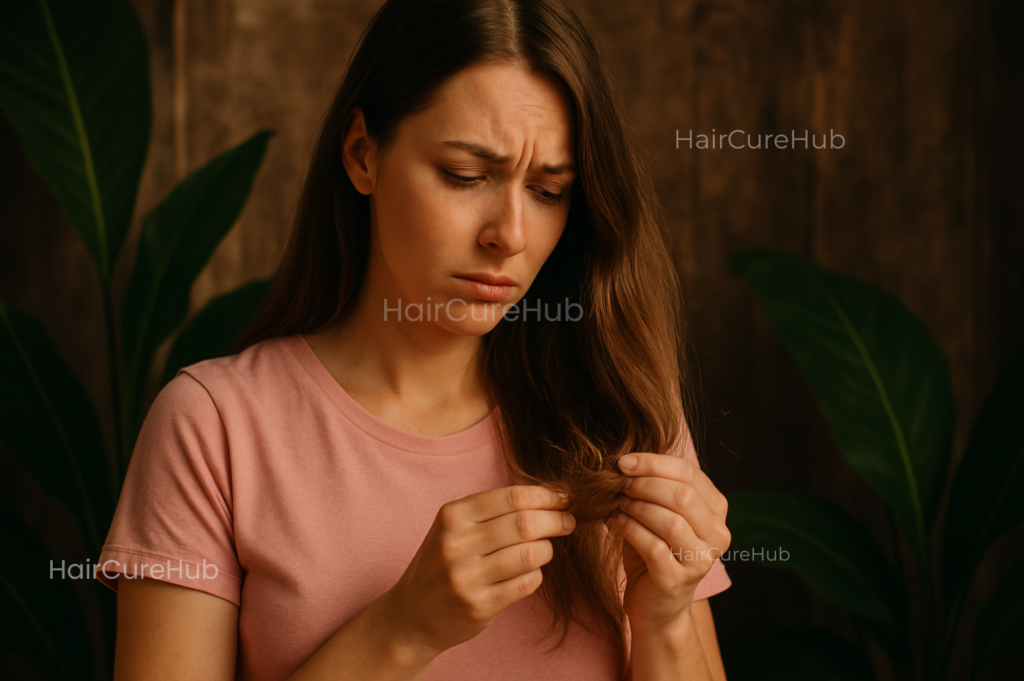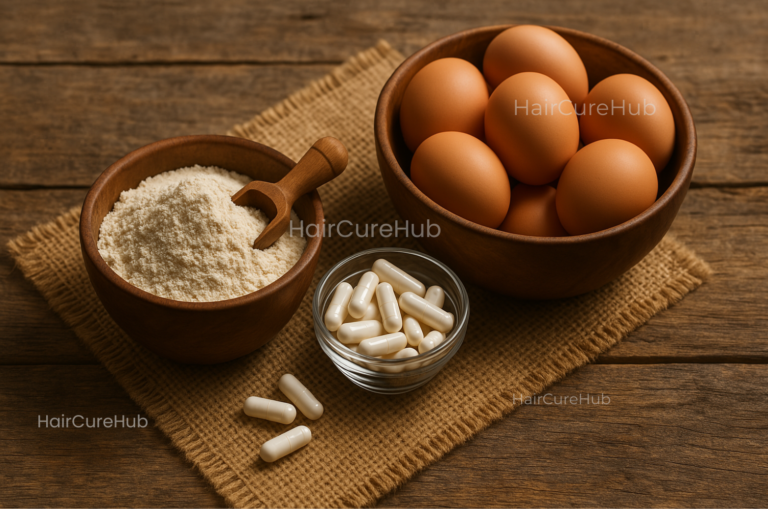HairGrowth | ProteinForHair | HairLoss | StrongerHair | HealthyHair | HairBreakage | ThinningHair | HairCareTips | Hair strengthening foods | HairTonic | HairSupplements | NaturalHairCare
Is Your Hair Breaking, Shedding, or Refusing to Grow?
You wake up and notice it—more hair on your pillow than usual. You run your fingers through your strands or comb them out, only to find alarming clumps left behind. What once was a full, healthy mane now appears thinner, lifeless, and fragile. No matter how many expensive shampoos, salon treatments, or DIY remedies you try, your hair seems to get worse, not better.
If this sounds familiar, you’re not alone. Hair loss, thinning, and excessive shedding affect millions of people—and not just due to age or genetics. In fact, there’s one overlooked factor that could be silently sabotaging your hair health.
Could you be missing the single most important building block your hair needs to grow strong and stay resilient?
Without enough protein, your hair:
❌ Sheds excessively because follicles lack structural support
❌ Becomes weak and brittle, leading to breakage and split ends
❌ Grows slower or stops growing altogether
❌ Loses shine and volume, making it look dull and lifeless
With the right protein balance, your hair can:
✔️ Regain strength and elasticity, reducing breakage
✔️ Grow longer and thicker, thanks to improved follicle function
✔️ Stay hydrated and healthy, preventing excessive dryness
✔️ Look shinier, smoother, and full of life
Doctors and scientists have long confirmed that protein is the ULTIMATE building block of strong, beautiful hair.
But here’s the question: Are you getting ENOUGH protein for your hair to thrive?
Why Protein is the Ultimate Hair Strengthener
Hair isn’t just something that sits on the surface—it’s a living fiber that grows out of your scalp and relies on internal nourishment to stay strong. And the most crucial of all nutrients for hair is protein.
From the inside out, protein plays a central role in everything related to hair production, repair, and appearance. Without it, your strands can’t maintain their shape, flexibility, or tensile strength. Even topical treatments can’t reverse the damage if your body is lacking protein at a cellular level.
So if you’re constantly dealing with:
- Increased breakage
- Poor growth rate
- Excessive shedding
- Limp, lifeless hair
It’s time to look inward—and assess whether your body is getting the protein it truly needs.
How Protein Forms the Foundation of Hair
Let’s break it down a little further.
Hair is primarily made of keratin, a tough, protective protein composed of various amino acids. These amino acids are assembled by hair follicle cells using the nutrients you get from food—specifically protein-rich foods.
Each strand of hair is structured in three key layers:
- Cuticle – The outer layer that protects your hair from external damage. A smooth cuticle gives hair its shine and protects it from breakage.
- Cortex – The thickest layer, made up of tightly packed keratin fibers. This is where strength, elasticity, and color reside.
- Medulla – The innermost layer, present mostly in thicker hair types, contributing to volume and flexibility.
When your protein intake is low, these layers become weaker, thinner, and more porous. Over time, your hair strands become prone to fraying, snapping, and excessive fall.
Protein and the Hair Growth Cycle
Your hair doesn’t just grow continuously—it follows a complex three-phase growth cycle that is highly dependent on nutritional status, especially protein availability:
- Anagen Phase (Growth) – This is the active phase when hair grows around half an inch per month. It can last for 2 to 7 years. Protein intake directly fuels this growth by enabling keratin production.
- Catagen Phase (Transition) – The brief phase when hair stops growing and detaches from the blood supply. While short, adequate protein supports cellular repair during this transition.
- Telogen Phase (Resting and Shedding) – Old strands fall out to make room for new ones. In protein-deficient states, more hair enters this shedding phase prematurely—a condition known as telogen effluvium.
Studies confirm that low-protein diets or conditions like malnutrition and crash dieting can lead to increased hair loss because follicles can’t remain in the growth phase without adequate fuel.
The Shocking Effects of Protein Deficiency on Hair

Protein deficiency doesn’t always show up in blood tests immediately—but your hair often reflects it first. Watch for these signs:
❌ Excessive daily shedding, especially after washing or brushing
❌ Split ends and mid-strand breakage, indicating a lack of structural support
❌ Hair that feels dry, stringy, or lacks bounce
❌ Thinning at the crown or temples, with visibly reduced volume
When your body doesn’t get enough protein, it prioritizes essential functions like muscle repair and immune function—meaning your hair gets the least amount of protein, making it weak and prone to breakage.
A study found that women who increased protein intake saw significant improvements in hair thickness and overall hair health.
The Best Protein Sources for Stronger Hair Growth
To restore hair health and encourage faster growth, incorporate these high-protein foods into your diet:
🔹Lean Meats & Poultry – Chicken, turkey, and lean beef
🔹Fatty Fish – Salmon, tuna, mackerel (rich in Omega-3s too!)
🔹Eggs – Packed with biotin, a key hair growth vitamin
🔹Legumes & Lentils – Great plant-based protein sources
🔹Nuts & Seeds – Almonds, chia seeds, and flaxseeds
🔹Dairy Products – Greek yogurt, cheese, and cottage cheese
Aim for at least 50-100g of protein per day for optimal hair health!
Research has shown that diets rich in protein help maintain hair strength, improve scalp health, and reduce hair fall.
How to Use Protein in Hair Care
Adding protein to your hair care regimen doesn’t mean just using more products—it’s about applying the right type of protein, in the right amount, at the right time. Here’s how to get started:
✔️ Protein Treatments
Use keratin-infused deep conditioners and hair masks once a week to strengthen damaged strands and reduce breakage. These treatments are especially helpful for color-treated, chemically processed, or heat-damaged hair that needs structural repair. Look for ingredients like hydrolyzed keratin, silk protein, wheat protein, or collagen.
✔️ Protein Shampoos
Switch to a gentle, sulfate-free shampoo that contains hydrolyzed proteins. These formulas cleanse your scalp without stripping away essential oils while delivering small doses of protein to reinforce the hair shaft. Perfect for daily or alternate-day use depending on your hair type.
✔️ DIY Protein Hair Masks
For a natural alternative, try a simple yet effective homemade mask:
- 1 egg (rich in protein and biotin)
- 2 tablespoons of yogurt (provides lactic acid and protein)
- 1 tablespoon of coconut oil (locks in moisture)
Mix and apply the mask from roots to ends, leave it on for 20–30 minutes, then rinse with cool water. This mask nourishes and repairs while giving your hair a silky texture.
✔️ Leave-In Protein Sprays or Serums
Lightweight leave-in treatments can offer daily protection against breakage, frizz, and styling damage. Choose products that list amino acids or peptides among the first few ingredients.
⚠️ Important Note:
Too much protein can actually backfire, leaving your hair feeling stiff, dry, or straw-like. This condition, known as protein overload, often happens when protein is not balanced with enough hydration.
The solution?
Always follow up protein treatments with moisturizing conditioners or masks. Think of protein as the bricks and moisture as the cement—your hair needs both for strength and flexibility.
Final Thoughts: Why Protein is the Key to Gorgeous, Strong Hair
At the core of every strong, shiny, and healthy strand lies one thing: protein. Without it, your hair can’t grow, heal, or defend itself against daily damage. And no matter how many serums or oils you use, you simply cannot repair protein-depleted hair without restoring its structural building blocks.
If you’ve been frustrated by breakage, slow growth, thinning edges, or dull texture, the answer might not be more products—but more protein, both inside and out.
✅ Start by nourishing your body with high-quality, protein-rich foods.
✅ Support your strands with targeted protein hair care treatments.
✅ Balance with moisture and scalp care for optimal results.
It’s time to stop the cycle of temporary fixes and start addressing the root cause of weak hair.
Take action today—fuel your hair with the strength it craves and rediscover the confidence that comes with healthier, fuller, and more beautiful hair.
Start your protein-powered hair journey NOW—and let every strand tell a story of strength, vitality, and growth.
Medical Disclaimer: This article is for informational purposes only and should not replace professional medical advice. Consult with a healthcare provider before starting any new treatment or supplement.
Could stress be silently stealing your hair? Ancient Ayurvedic secrets may hold the key to reversing hair loss and restoring strength—are you ready to unlock them?
👉 Click here to Discover the Ayurvedic Secrets to Combat Stress-Induced Hair Loss!
How we reviewed this article:
SOURCES
HairCureHub follows strict sourcing guidelines and relies on reputable articles, medical journals, and trusted sources. We prioritize accuracy and integrity by using only high-quality, credible references and never promote exaggerated claims or unverified remedies. Our experts continually track advancements in Hair Wellness and Care, ensuring our articles reflect the latest research and trusted information. Learn more about our commitment to reliable content by reading our policy.
Growing Evidence of the Beneficial Effects of a Marine Protein-Based Dietary Supplement for Treating Hair Loss
https://pubmed.ncbi.nlm.nih.gov/28921826
Dietary Protein Deficit and Deregulated Autophagy: A New Clinico Pathologic Perspective
https://pmc.ncbi.nlm.nih.gov/articles/PMC6434747/?utm_source
Health Improvement of Human Hair and Their Reshaping Using Keratin K31 Protein Expressed in Escherichia coli
https://pmc.ncbi.nlm.nih.gov/articles/PMC6218806/?utm_source
Diet and Hair Loss: Effects of Nutrient Deficiency and Supplement Use
https://pmc.ncbi.nlm.nih.gov/articles/PMC5315033/?utm_source
Extra-Strength Marine Protein Supplement to Promote Hair Growth and Decrease Shedding in Women with Self-Perceived Thinning Hair
https://pubmed.ncbi.nlm.nih.gov/25883641
Selective Oxidative [4+2] Imine/Alkene Annulation with H2 Liberation Induced by Photo-Oxidation
https://pubmed.ncbi.nlm.nih.gov/29206343
Physiology, Hair
https://www.ncbi.nlm.nih.gov/books/NBK499948


